Comprehensive Report on Organisational Behaviour Principles
VerifiedAdded on 2023/06/07
|12
|4303
|277
Report
AI Summary
This report provides an overview of organisational behaviour, focusing on its impact on individual and team performance within an organisation, using Unilever as a case study. It examines the influence of organisational culture, politics, and power, applying Handy's cultural model to understand Unilever's approach. The report also analyses content and process theories of motivation, particularly Maslow's hierarchy of needs and Locke's goal-setting theory, to explore how motivation affects organisational goals. Furthermore, it differentiates between effective and ineffective teams, highlighting the importance of cooperation and communication. The report concludes by discussing the philosophies underpinning organisational behaviour and their effects on organisational situations, providing a comprehensive understanding of key concepts and their practical applications in a business setting. Desklib provides solved assignments for students.
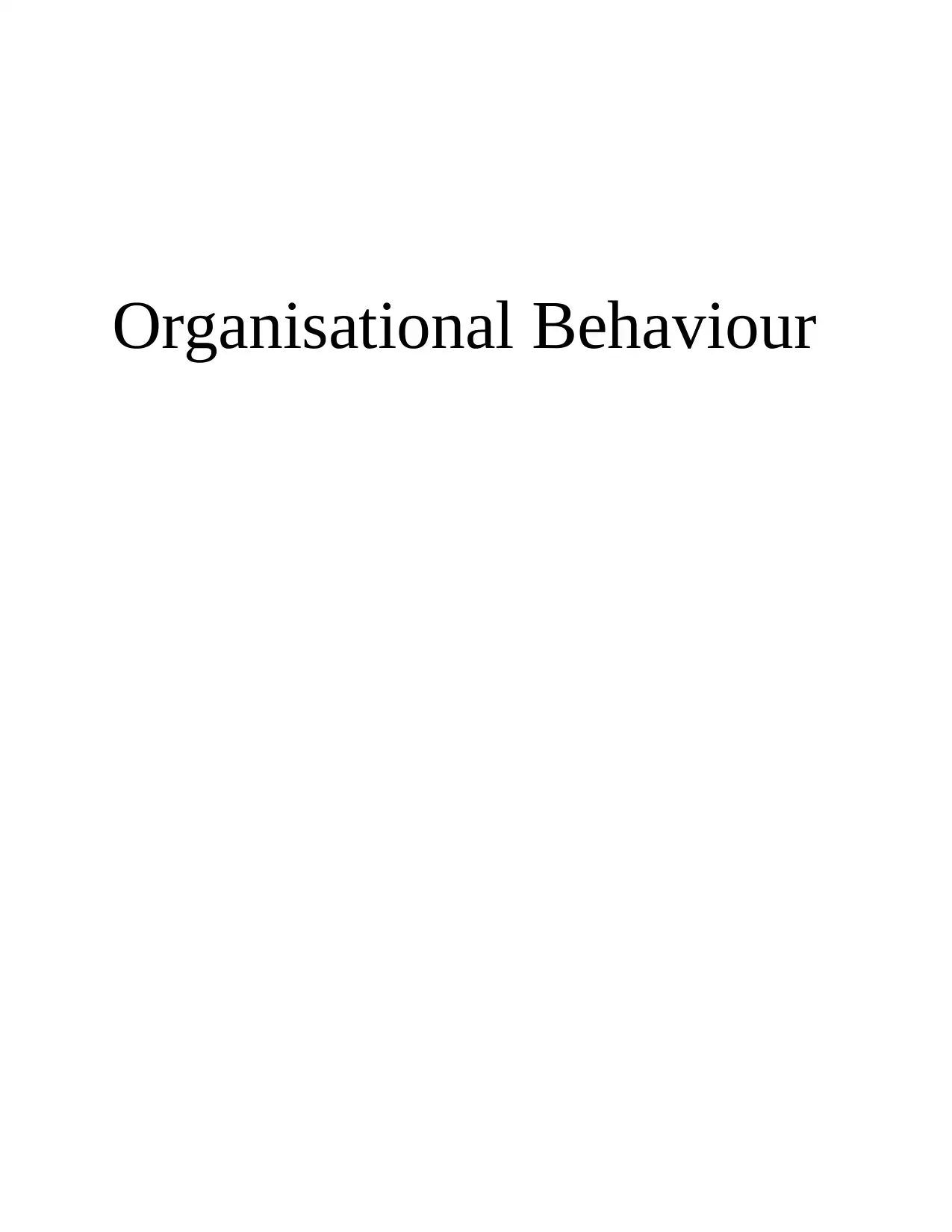
Organisational Behaviour
Paraphrase This Document
Need a fresh take? Get an instant paraphrase of this document with our AI Paraphraser
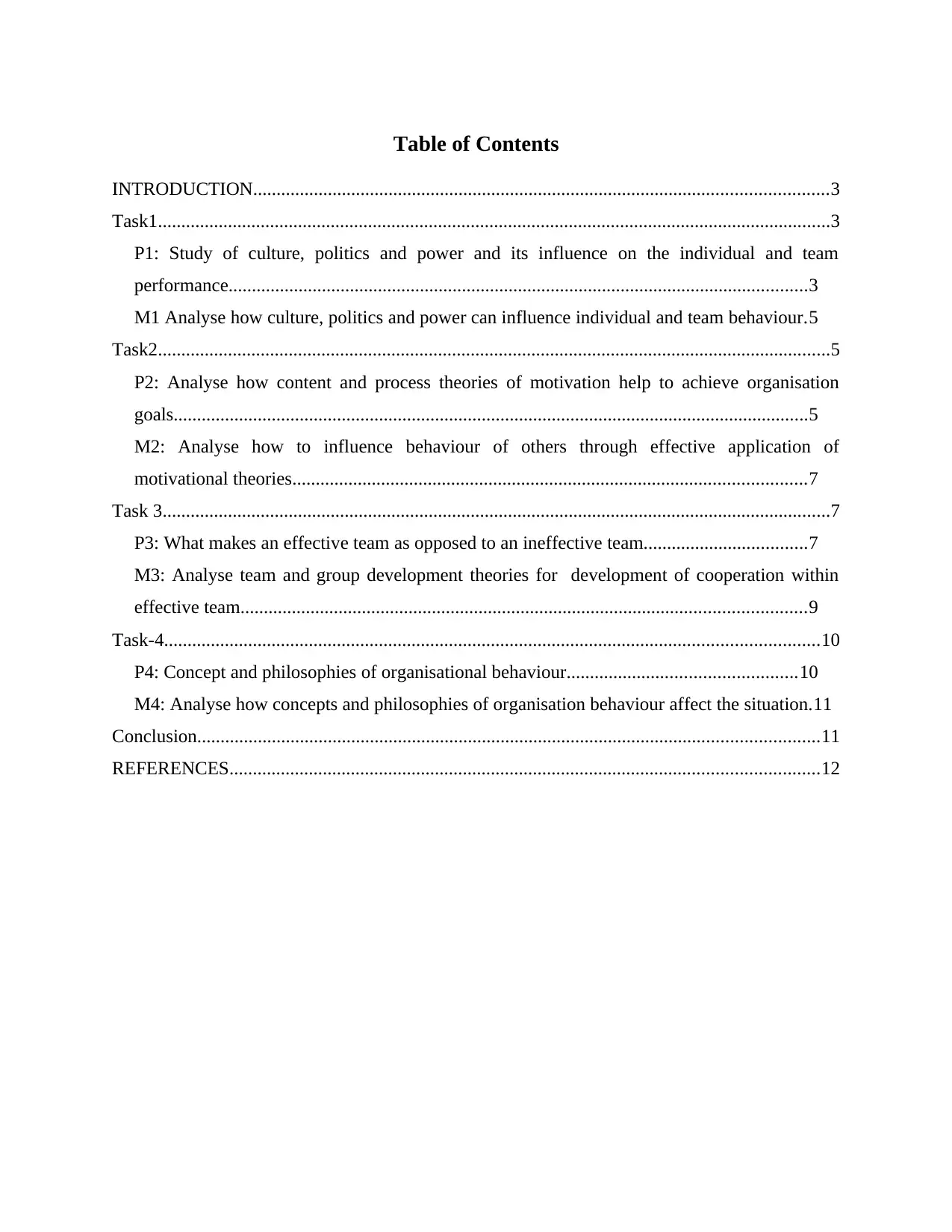
Table of Contents
INTRODUCTION...........................................................................................................................3
Task1................................................................................................................................................3
P1: Study of culture, politics and power and its influence on the individual and team
performance............................................................................................................................3
M1 Analyse how culture, politics and power can influence individual and team behaviour.5
Task2................................................................................................................................................5
P2: Analyse how content and process theories of motivation help to achieve organisation
goals........................................................................................................................................5
M2: Analyse how to influence behaviour of others through effective application of
motivational theories..............................................................................................................7
Task 3...............................................................................................................................................7
P3: What makes an effective team as opposed to an ineffective team...................................7
M3: Analyse team and group development theories for development of cooperation within
effective team.........................................................................................................................9
Task-4............................................................................................................................................10
P4: Concept and philosophies of organisational behaviour.................................................10
M4: Analyse how concepts and philosophies of organisation behaviour affect the situation.11
Conclusion.....................................................................................................................................11
REFERENCES..............................................................................................................................12
INTRODUCTION...........................................................................................................................3
Task1................................................................................................................................................3
P1: Study of culture, politics and power and its influence on the individual and team
performance............................................................................................................................3
M1 Analyse how culture, politics and power can influence individual and team behaviour.5
Task2................................................................................................................................................5
P2: Analyse how content and process theories of motivation help to achieve organisation
goals........................................................................................................................................5
M2: Analyse how to influence behaviour of others through effective application of
motivational theories..............................................................................................................7
Task 3...............................................................................................................................................7
P3: What makes an effective team as opposed to an ineffective team...................................7
M3: Analyse team and group development theories for development of cooperation within
effective team.........................................................................................................................9
Task-4............................................................................................................................................10
P4: Concept and philosophies of organisational behaviour.................................................10
M4: Analyse how concepts and philosophies of organisation behaviour affect the situation.11
Conclusion.....................................................................................................................................11
REFERENCES..............................................................................................................................12
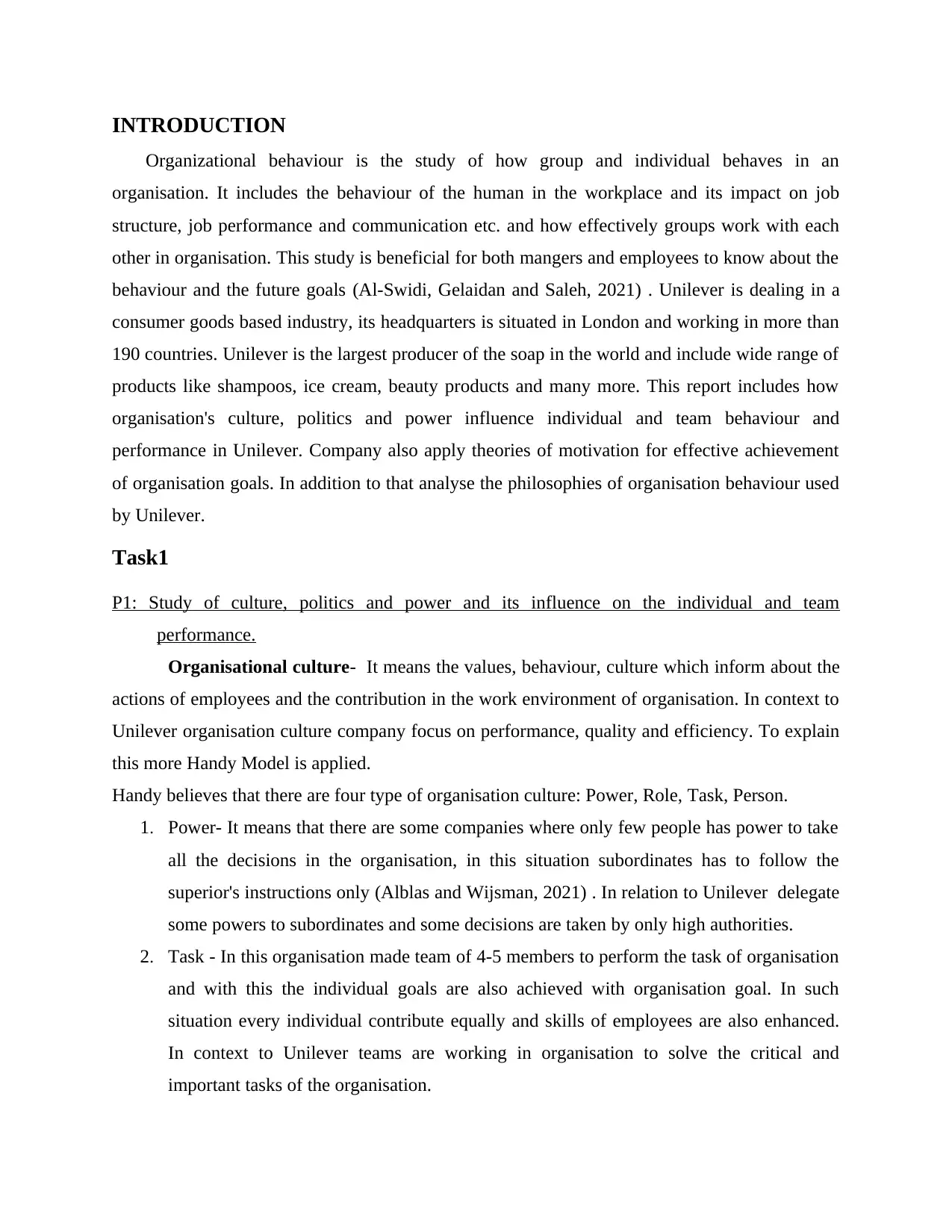
INTRODUCTION
Organizational behaviour is the study of how group and individual behaves in an
organisation. It includes the behaviour of the human in the workplace and its impact on job
structure, job performance and communication etc. and how effectively groups work with each
other in organisation. This study is beneficial for both mangers and employees to know about the
behaviour and the future goals (Al-Swidi, Gelaidan and Saleh, 2021) . Unilever is dealing in a
consumer goods based industry, its headquarters is situated in London and working in more than
190 countries. Unilever is the largest producer of the soap in the world and include wide range of
products like shampoos, ice cream, beauty products and many more. This report includes how
organisation's culture, politics and power influence individual and team behaviour and
performance in Unilever. Company also apply theories of motivation for effective achievement
of organisation goals. In addition to that analyse the philosophies of organisation behaviour used
by Unilever.
Task1
P1: Study of culture, politics and power and its influence on the individual and team
performance.
Organisational culture- It means the values, behaviour, culture which inform about the
actions of employees and the contribution in the work environment of organisation. In context to
Unilever organisation culture company focus on performance, quality and efficiency. To explain
this more Handy Model is applied.
Handy believes that there are four type of organisation culture: Power, Role, Task, Person.
1. Power- It means that there are some companies where only few people has power to take
all the decisions in the organisation, in this situation subordinates has to follow the
superior's instructions only (Alblas and Wijsman, 2021) . In relation to Unilever delegate
some powers to subordinates and some decisions are taken by only high authorities.
2. Task - In this organisation made team of 4-5 members to perform the task of organisation
and with this the individual goals are also achieved with organisation goal. In such
situation every individual contribute equally and skills of employees are also enhanced.
In context to Unilever teams are working in organisation to solve the critical and
important tasks of the organisation.
Organizational behaviour is the study of how group and individual behaves in an
organisation. It includes the behaviour of the human in the workplace and its impact on job
structure, job performance and communication etc. and how effectively groups work with each
other in organisation. This study is beneficial for both mangers and employees to know about the
behaviour and the future goals (Al-Swidi, Gelaidan and Saleh, 2021) . Unilever is dealing in a
consumer goods based industry, its headquarters is situated in London and working in more than
190 countries. Unilever is the largest producer of the soap in the world and include wide range of
products like shampoos, ice cream, beauty products and many more. This report includes how
organisation's culture, politics and power influence individual and team behaviour and
performance in Unilever. Company also apply theories of motivation for effective achievement
of organisation goals. In addition to that analyse the philosophies of organisation behaviour used
by Unilever.
Task1
P1: Study of culture, politics and power and its influence on the individual and team
performance.
Organisational culture- It means the values, behaviour, culture which inform about the
actions of employees and the contribution in the work environment of organisation. In context to
Unilever organisation culture company focus on performance, quality and efficiency. To explain
this more Handy Model is applied.
Handy believes that there are four type of organisation culture: Power, Role, Task, Person.
1. Power- It means that there are some companies where only few people has power to take
all the decisions in the organisation, in this situation subordinates has to follow the
superior's instructions only (Alblas and Wijsman, 2021) . In relation to Unilever delegate
some powers to subordinates and some decisions are taken by only high authorities.
2. Task - In this organisation made team of 4-5 members to perform the task of organisation
and with this the individual goals are also achieved with organisation goal. In such
situation every individual contribute equally and skills of employees are also enhanced.
In context to Unilever teams are working in organisation to solve the critical and
important tasks of the organisation.
⊘ This is a preview!⊘
Do you want full access?
Subscribe today to unlock all pages.

Trusted by 1+ million students worldwide
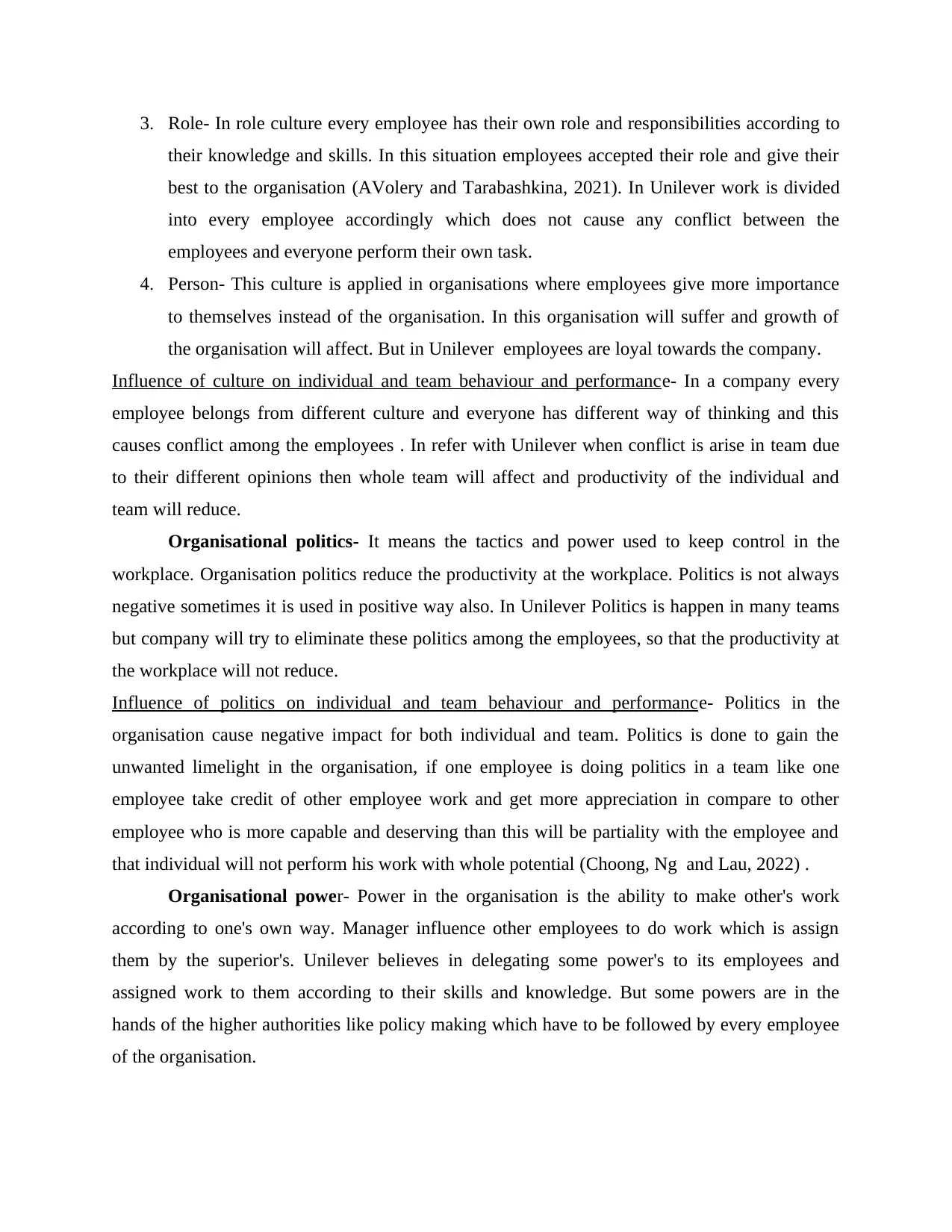
3. Role- In role culture every employee has their own role and responsibilities according to
their knowledge and skills. In this situation employees accepted their role and give their
best to the organisation (AVolery and Tarabashkina, 2021). In Unilever work is divided
into every employee accordingly which does not cause any conflict between the
employees and everyone perform their own task.
4. Person- This culture is applied in organisations where employees give more importance
to themselves instead of the organisation. In this organisation will suffer and growth of
the organisation will affect. But in Unilever employees are loyal towards the company.
Influence of culture on individual and team behaviour and performance- In a company every
employee belongs from different culture and everyone has different way of thinking and this
causes conflict among the employees . In refer with Unilever when conflict is arise in team due
to their different opinions then whole team will affect and productivity of the individual and
team will reduce.
Organisational politics- It means the tactics and power used to keep control in the
workplace. Organisation politics reduce the productivity at the workplace. Politics is not always
negative sometimes it is used in positive way also. In Unilever Politics is happen in many teams
but company will try to eliminate these politics among the employees, so that the productivity at
the workplace will not reduce.
Influence of politics on individual and team behaviour and performance- Politics in the
organisation cause negative impact for both individual and team. Politics is done to gain the
unwanted limelight in the organisation, if one employee is doing politics in a team like one
employee take credit of other employee work and get more appreciation in compare to other
employee who is more capable and deserving than this will be partiality with the employee and
that individual will not perform his work with whole potential (Choong, Ng and Lau, 2022) .
Organisational power- Power in the organisation is the ability to make other's work
according to one's own way. Manager influence other employees to do work which is assign
them by the superior's. Unilever believes in delegating some power's to its employees and
assigned work to them according to their skills and knowledge. But some powers are in the
hands of the higher authorities like policy making which have to be followed by every employee
of the organisation.
their knowledge and skills. In this situation employees accepted their role and give their
best to the organisation (AVolery and Tarabashkina, 2021). In Unilever work is divided
into every employee accordingly which does not cause any conflict between the
employees and everyone perform their own task.
4. Person- This culture is applied in organisations where employees give more importance
to themselves instead of the organisation. In this organisation will suffer and growth of
the organisation will affect. But in Unilever employees are loyal towards the company.
Influence of culture on individual and team behaviour and performance- In a company every
employee belongs from different culture and everyone has different way of thinking and this
causes conflict among the employees . In refer with Unilever when conflict is arise in team due
to their different opinions then whole team will affect and productivity of the individual and
team will reduce.
Organisational politics- It means the tactics and power used to keep control in the
workplace. Organisation politics reduce the productivity at the workplace. Politics is not always
negative sometimes it is used in positive way also. In Unilever Politics is happen in many teams
but company will try to eliminate these politics among the employees, so that the productivity at
the workplace will not reduce.
Influence of politics on individual and team behaviour and performance- Politics in the
organisation cause negative impact for both individual and team. Politics is done to gain the
unwanted limelight in the organisation, if one employee is doing politics in a team like one
employee take credit of other employee work and get more appreciation in compare to other
employee who is more capable and deserving than this will be partiality with the employee and
that individual will not perform his work with whole potential (Choong, Ng and Lau, 2022) .
Organisational power- Power in the organisation is the ability to make other's work
according to one's own way. Manager influence other employees to do work which is assign
them by the superior's. Unilever believes in delegating some power's to its employees and
assigned work to them according to their skills and knowledge. But some powers are in the
hands of the higher authorities like policy making which have to be followed by every employee
of the organisation.
Paraphrase This Document
Need a fresh take? Get an instant paraphrase of this document with our AI Paraphraser
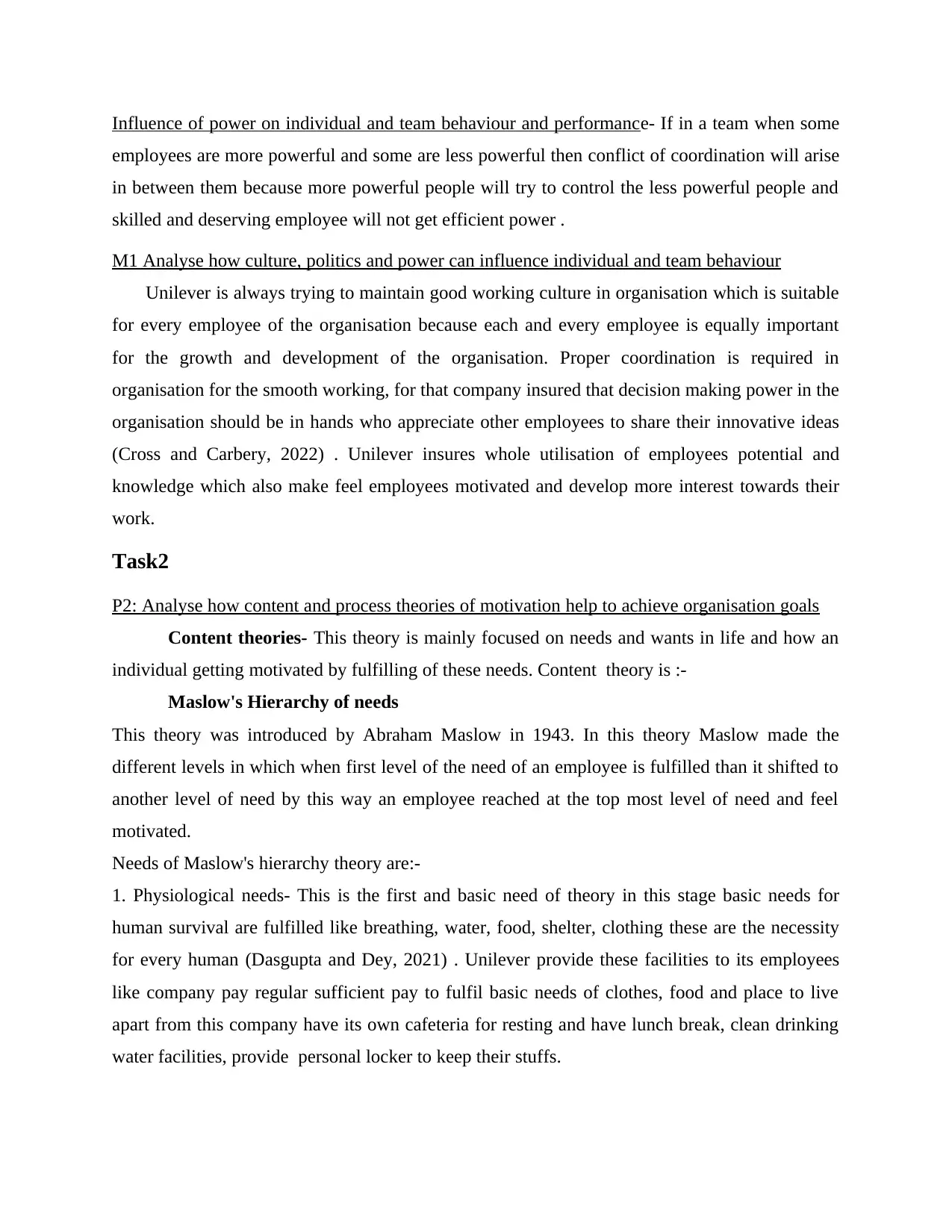
Influence of power on individual and team behaviour and performance- If in a team when some
employees are more powerful and some are less powerful then conflict of coordination will arise
in between them because more powerful people will try to control the less powerful people and
skilled and deserving employee will not get efficient power .
M1 Analyse how culture, politics and power can influence individual and team behaviour
Unilever is always trying to maintain good working culture in organisation which is suitable
for every employee of the organisation because each and every employee is equally important
for the growth and development of the organisation. Proper coordination is required in
organisation for the smooth working, for that company insured that decision making power in the
organisation should be in hands who appreciate other employees to share their innovative ideas
(Cross and Carbery, 2022) . Unilever insures whole utilisation of employees potential and
knowledge which also make feel employees motivated and develop more interest towards their
work.
Task2
P2: Analyse how content and process theories of motivation help to achieve organisation goals
Content theories- This theory is mainly focused on needs and wants in life and how an
individual getting motivated by fulfilling of these needs. Content theory is :-
Maslow's Hierarchy of needs
This theory was introduced by Abraham Maslow in 1943. In this theory Maslow made the
different levels in which when first level of the need of an employee is fulfilled than it shifted to
another level of need by this way an employee reached at the top most level of need and feel
motivated.
Needs of Maslow's hierarchy theory are:-
1. Physiological needs- This is the first and basic need of theory in this stage basic needs for
human survival are fulfilled like breathing, water, food, shelter, clothing these are the necessity
for every human (Dasgupta and Dey, 2021) . Unilever provide these facilities to its employees
like company pay regular sufficient pay to fulfil basic needs of clothes, food and place to live
apart from this company have its own cafeteria for resting and have lunch break, clean drinking
water facilities, provide personal locker to keep their stuffs.
employees are more powerful and some are less powerful then conflict of coordination will arise
in between them because more powerful people will try to control the less powerful people and
skilled and deserving employee will not get efficient power .
M1 Analyse how culture, politics and power can influence individual and team behaviour
Unilever is always trying to maintain good working culture in organisation which is suitable
for every employee of the organisation because each and every employee is equally important
for the growth and development of the organisation. Proper coordination is required in
organisation for the smooth working, for that company insured that decision making power in the
organisation should be in hands who appreciate other employees to share their innovative ideas
(Cross and Carbery, 2022) . Unilever insures whole utilisation of employees potential and
knowledge which also make feel employees motivated and develop more interest towards their
work.
Task2
P2: Analyse how content and process theories of motivation help to achieve organisation goals
Content theories- This theory is mainly focused on needs and wants in life and how an
individual getting motivated by fulfilling of these needs. Content theory is :-
Maslow's Hierarchy of needs
This theory was introduced by Abraham Maslow in 1943. In this theory Maslow made the
different levels in which when first level of the need of an employee is fulfilled than it shifted to
another level of need by this way an employee reached at the top most level of need and feel
motivated.
Needs of Maslow's hierarchy theory are:-
1. Physiological needs- This is the first and basic need of theory in this stage basic needs for
human survival are fulfilled like breathing, water, food, shelter, clothing these are the necessity
for every human (Dasgupta and Dey, 2021) . Unilever provide these facilities to its employees
like company pay regular sufficient pay to fulfil basic needs of clothes, food and place to live
apart from this company have its own cafeteria for resting and have lunch break, clean drinking
water facilities, provide personal locker to keep their stuffs.
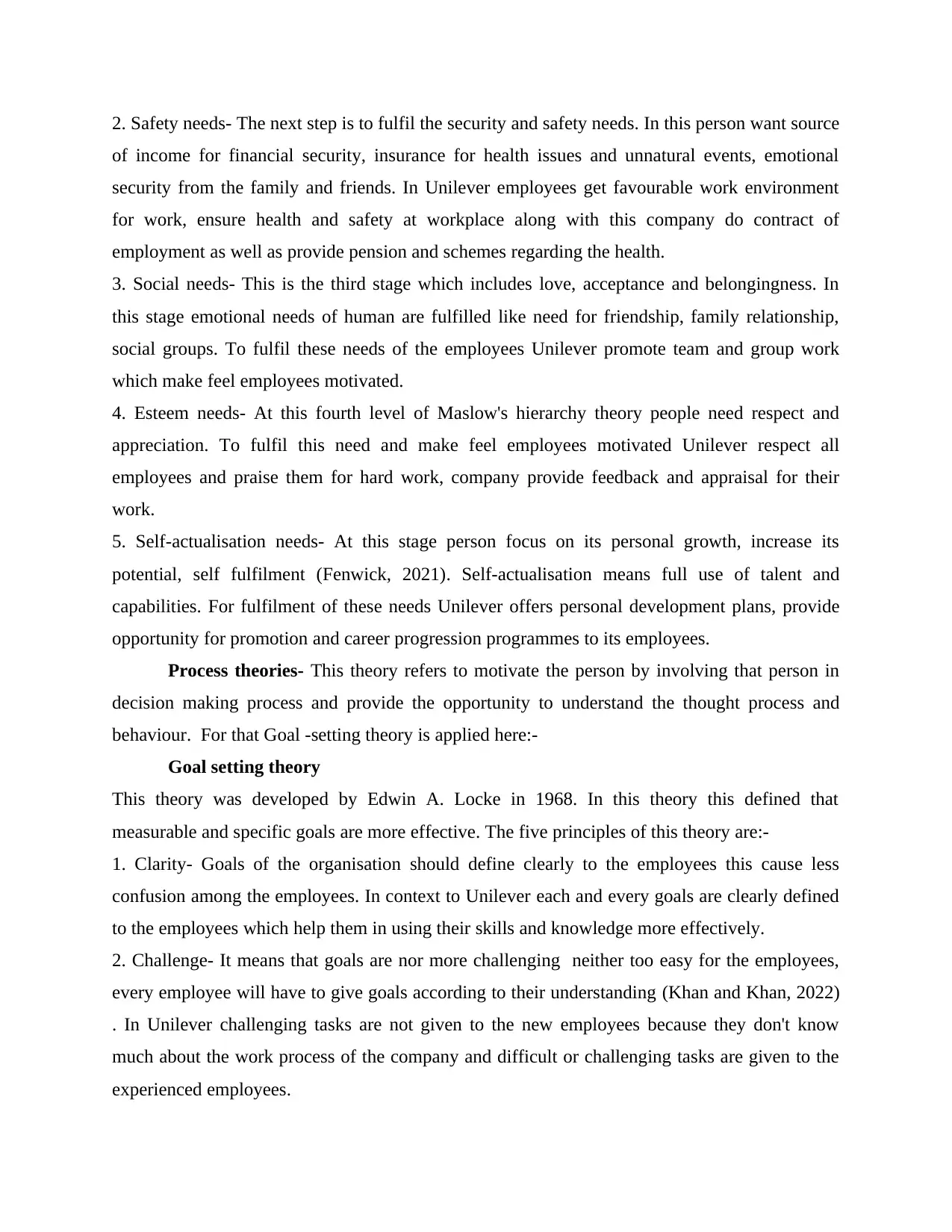
2. Safety needs- The next step is to fulfil the security and safety needs. In this person want source
of income for financial security, insurance for health issues and unnatural events, emotional
security from the family and friends. In Unilever employees get favourable work environment
for work, ensure health and safety at workplace along with this company do contract of
employment as well as provide pension and schemes regarding the health.
3. Social needs- This is the third stage which includes love, acceptance and belongingness. In
this stage emotional needs of human are fulfilled like need for friendship, family relationship,
social groups. To fulfil these needs of the employees Unilever promote team and group work
which make feel employees motivated.
4. Esteem needs- At this fourth level of Maslow's hierarchy theory people need respect and
appreciation. To fulfil this need and make feel employees motivated Unilever respect all
employees and praise them for hard work, company provide feedback and appraisal for their
work.
5. Self-actualisation needs- At this stage person focus on its personal growth, increase its
potential, self fulfilment (Fenwick, 2021). Self-actualisation means full use of talent and
capabilities. For fulfilment of these needs Unilever offers personal development plans, provide
opportunity for promotion and career progression programmes to its employees.
Process theories- This theory refers to motivate the person by involving that person in
decision making process and provide the opportunity to understand the thought process and
behaviour. For that Goal -setting theory is applied here:-
Goal setting theory
This theory was developed by Edwin A. Locke in 1968. In this theory this defined that
measurable and specific goals are more effective. The five principles of this theory are:-
1. Clarity- Goals of the organisation should define clearly to the employees this cause less
confusion among the employees. In context to Unilever each and every goals are clearly defined
to the employees which help them in using their skills and knowledge more effectively.
2. Challenge- It means that goals are nor more challenging neither too easy for the employees,
every employee will have to give goals according to their understanding (Khan and Khan, 2022)
. In Unilever challenging tasks are not given to the new employees because they don't know
much about the work process of the company and difficult or challenging tasks are given to the
experienced employees.
of income for financial security, insurance for health issues and unnatural events, emotional
security from the family and friends. In Unilever employees get favourable work environment
for work, ensure health and safety at workplace along with this company do contract of
employment as well as provide pension and schemes regarding the health.
3. Social needs- This is the third stage which includes love, acceptance and belongingness. In
this stage emotional needs of human are fulfilled like need for friendship, family relationship,
social groups. To fulfil these needs of the employees Unilever promote team and group work
which make feel employees motivated.
4. Esteem needs- At this fourth level of Maslow's hierarchy theory people need respect and
appreciation. To fulfil this need and make feel employees motivated Unilever respect all
employees and praise them for hard work, company provide feedback and appraisal for their
work.
5. Self-actualisation needs- At this stage person focus on its personal growth, increase its
potential, self fulfilment (Fenwick, 2021). Self-actualisation means full use of talent and
capabilities. For fulfilment of these needs Unilever offers personal development plans, provide
opportunity for promotion and career progression programmes to its employees.
Process theories- This theory refers to motivate the person by involving that person in
decision making process and provide the opportunity to understand the thought process and
behaviour. For that Goal -setting theory is applied here:-
Goal setting theory
This theory was developed by Edwin A. Locke in 1968. In this theory this defined that
measurable and specific goals are more effective. The five principles of this theory are:-
1. Clarity- Goals of the organisation should define clearly to the employees this cause less
confusion among the employees. In context to Unilever each and every goals are clearly defined
to the employees which help them in using their skills and knowledge more effectively.
2. Challenge- It means that goals are nor more challenging neither too easy for the employees,
every employee will have to give goals according to their understanding (Khan and Khan, 2022)
. In Unilever challenging tasks are not given to the new employees because they don't know
much about the work process of the company and difficult or challenging tasks are given to the
experienced employees.
⊘ This is a preview!⊘
Do you want full access?
Subscribe today to unlock all pages.

Trusted by 1+ million students worldwide
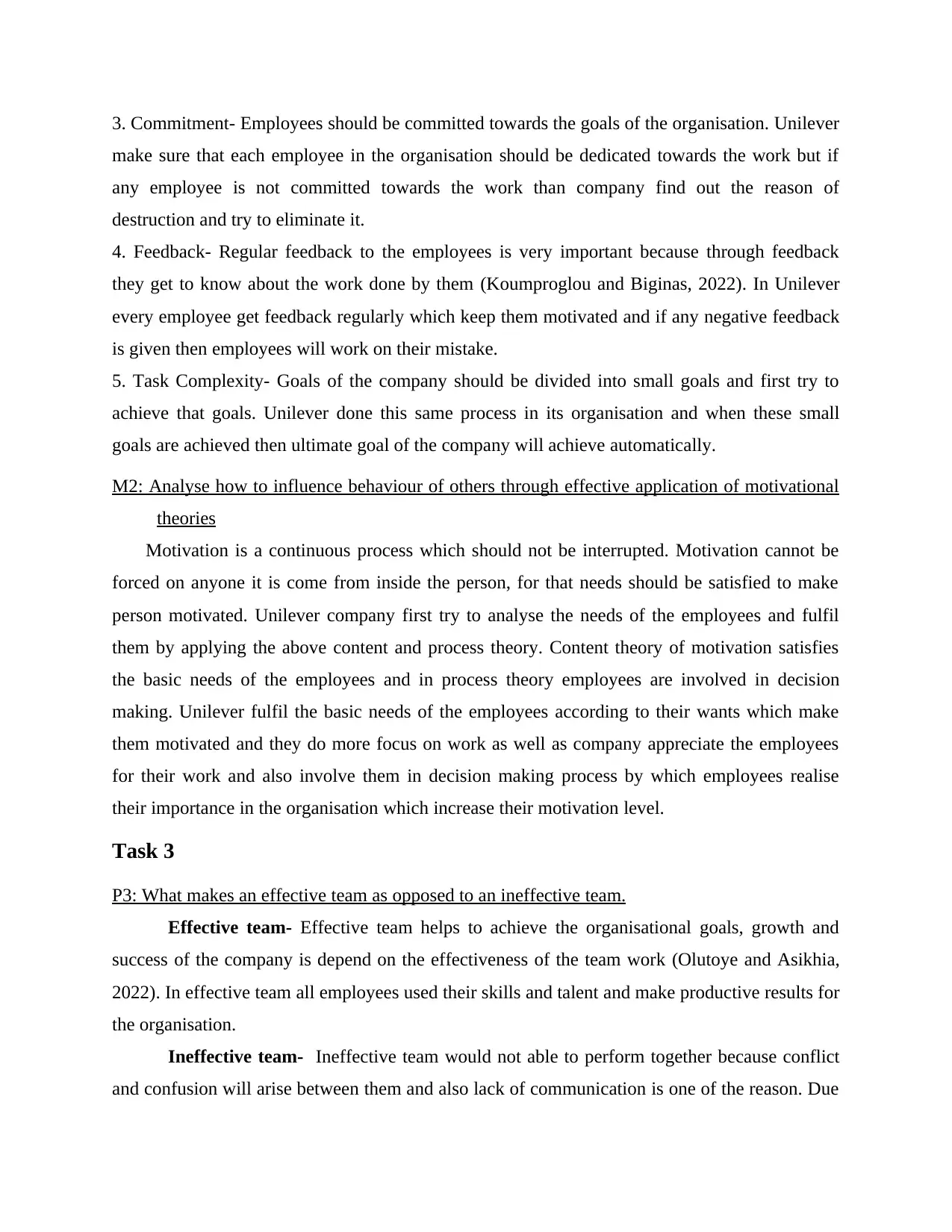
3. Commitment- Employees should be committed towards the goals of the organisation. Unilever
make sure that each employee in the organisation should be dedicated towards the work but if
any employee is not committed towards the work than company find out the reason of
destruction and try to eliminate it.
4. Feedback- Regular feedback to the employees is very important because through feedback
they get to know about the work done by them (Koumproglou and Biginas, 2022). In Unilever
every employee get feedback regularly which keep them motivated and if any negative feedback
is given then employees will work on their mistake.
5. Task Complexity- Goals of the company should be divided into small goals and first try to
achieve that goals. Unilever done this same process in its organisation and when these small
goals are achieved then ultimate goal of the company will achieve automatically.
M2: Analyse how to influence behaviour of others through effective application of motivational
theories
Motivation is a continuous process which should not be interrupted. Motivation cannot be
forced on anyone it is come from inside the person, for that needs should be satisfied to make
person motivated. Unilever company first try to analyse the needs of the employees and fulfil
them by applying the above content and process theory. Content theory of motivation satisfies
the basic needs of the employees and in process theory employees are involved in decision
making. Unilever fulfil the basic needs of the employees according to their wants which make
them motivated and they do more focus on work as well as company appreciate the employees
for their work and also involve them in decision making process by which employees realise
their importance in the organisation which increase their motivation level.
Task 3
P3: What makes an effective team as opposed to an ineffective team.
Effective team- Effective team helps to achieve the organisational goals, growth and
success of the company is depend on the effectiveness of the team work (Olutoye and Asikhia,
2022). In effective team all employees used their skills and talent and make productive results for
the organisation.
Ineffective team- Ineffective team would not able to perform together because conflict
and confusion will arise between them and also lack of communication is one of the reason. Due
make sure that each employee in the organisation should be dedicated towards the work but if
any employee is not committed towards the work than company find out the reason of
destruction and try to eliminate it.
4. Feedback- Regular feedback to the employees is very important because through feedback
they get to know about the work done by them (Koumproglou and Biginas, 2022). In Unilever
every employee get feedback regularly which keep them motivated and if any negative feedback
is given then employees will work on their mistake.
5. Task Complexity- Goals of the company should be divided into small goals and first try to
achieve that goals. Unilever done this same process in its organisation and when these small
goals are achieved then ultimate goal of the company will achieve automatically.
M2: Analyse how to influence behaviour of others through effective application of motivational
theories
Motivation is a continuous process which should not be interrupted. Motivation cannot be
forced on anyone it is come from inside the person, for that needs should be satisfied to make
person motivated. Unilever company first try to analyse the needs of the employees and fulfil
them by applying the above content and process theory. Content theory of motivation satisfies
the basic needs of the employees and in process theory employees are involved in decision
making. Unilever fulfil the basic needs of the employees according to their wants which make
them motivated and they do more focus on work as well as company appreciate the employees
for their work and also involve them in decision making process by which employees realise
their importance in the organisation which increase their motivation level.
Task 3
P3: What makes an effective team as opposed to an ineffective team.
Effective team- Effective team helps to achieve the organisational goals, growth and
success of the company is depend on the effectiveness of the team work (Olutoye and Asikhia,
2022). In effective team all employees used their skills and talent and make productive results for
the organisation.
Ineffective team- Ineffective team would not able to perform together because conflict
and confusion will arise between them and also lack of communication is one of the reason. Due
Paraphrase This Document
Need a fresh take? Get an instant paraphrase of this document with our AI Paraphraser
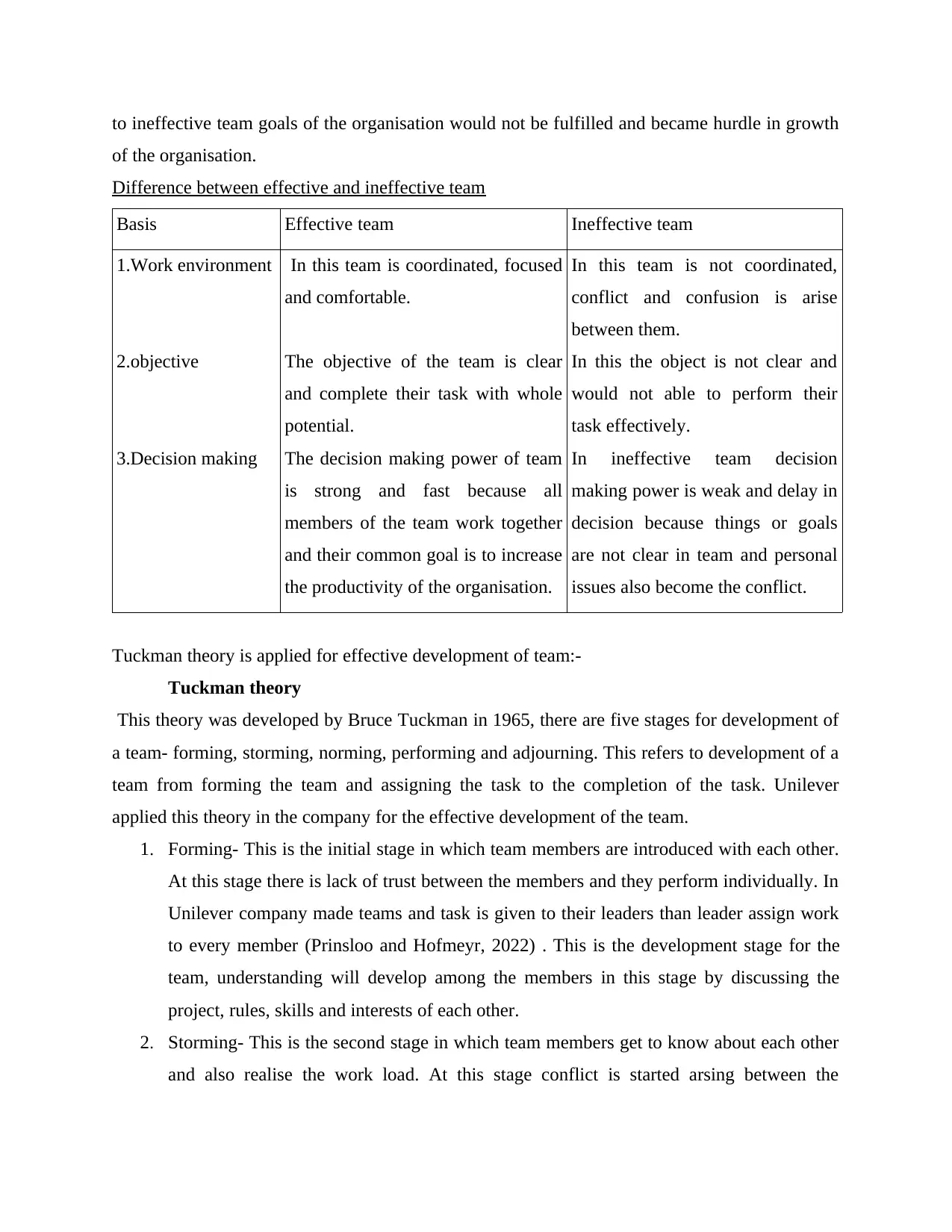
to ineffective team goals of the organisation would not be fulfilled and became hurdle in growth
of the organisation.
Difference between effective and ineffective team
Basis Effective team Ineffective team
1.Work environment
2.objective
3.Decision making
In this team is coordinated, focused
and comfortable.
The objective of the team is clear
and complete their task with whole
potential.
The decision making power of team
is strong and fast because all
members of the team work together
and their common goal is to increase
the productivity of the organisation.
In this team is not coordinated,
conflict and confusion is arise
between them.
In this the object is not clear and
would not able to perform their
task effectively.
In ineffective team decision
making power is weak and delay in
decision because things or goals
are not clear in team and personal
issues also become the conflict.
Tuckman theory is applied for effective development of team:-
Tuckman theory
This theory was developed by Bruce Tuckman in 1965, there are five stages for development of
a team- forming, storming, norming, performing and adjourning. This refers to development of a
team from forming the team and assigning the task to the completion of the task. Unilever
applied this theory in the company for the effective development of the team.
1. Forming- This is the initial stage in which team members are introduced with each other.
At this stage there is lack of trust between the members and they perform individually. In
Unilever company made teams and task is given to their leaders than leader assign work
to every member (Prinsloo and Hofmeyr, 2022) . This is the development stage for the
team, understanding will develop among the members in this stage by discussing the
project, rules, skills and interests of each other.
2. Storming- This is the second stage in which team members get to know about each other
and also realise the work load. At this stage conflict is started arsing between the
of the organisation.
Difference between effective and ineffective team
Basis Effective team Ineffective team
1.Work environment
2.objective
3.Decision making
In this team is coordinated, focused
and comfortable.
The objective of the team is clear
and complete their task with whole
potential.
The decision making power of team
is strong and fast because all
members of the team work together
and their common goal is to increase
the productivity of the organisation.
In this team is not coordinated,
conflict and confusion is arise
between them.
In this the object is not clear and
would not able to perform their
task effectively.
In ineffective team decision
making power is weak and delay in
decision because things or goals
are not clear in team and personal
issues also become the conflict.
Tuckman theory is applied for effective development of team:-
Tuckman theory
This theory was developed by Bruce Tuckman in 1965, there are five stages for development of
a team- forming, storming, norming, performing and adjourning. This refers to development of a
team from forming the team and assigning the task to the completion of the task. Unilever
applied this theory in the company for the effective development of the team.
1. Forming- This is the initial stage in which team members are introduced with each other.
At this stage there is lack of trust between the members and they perform individually. In
Unilever company made teams and task is given to their leaders than leader assign work
to every member (Prinsloo and Hofmeyr, 2022) . This is the development stage for the
team, understanding will develop among the members in this stage by discussing the
project, rules, skills and interests of each other.
2. Storming- This is the second stage in which team members get to know about each other
and also realise the work load. At this stage conflict is started arsing between the
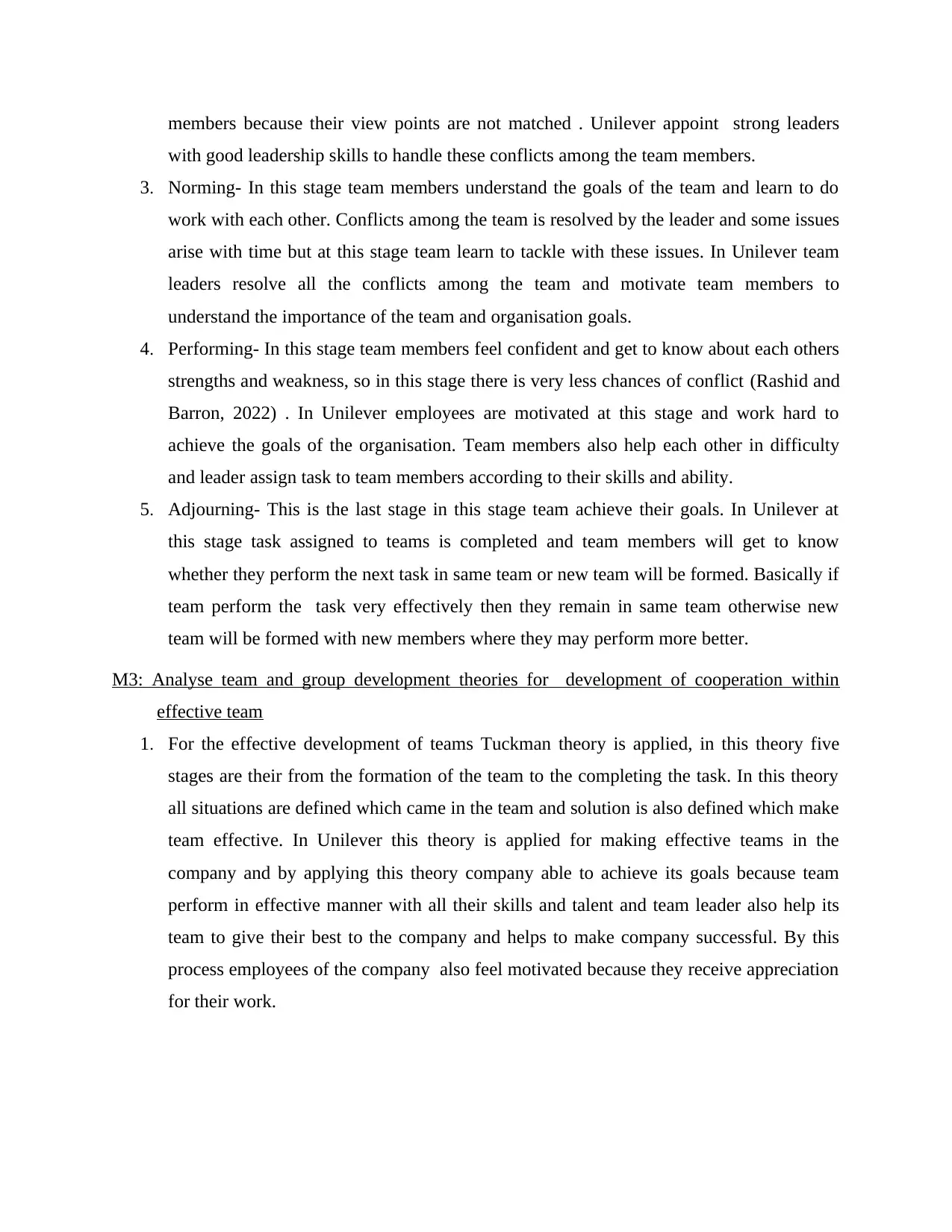
members because their view points are not matched . Unilever appoint strong leaders
with good leadership skills to handle these conflicts among the team members.
3. Norming- In this stage team members understand the goals of the team and learn to do
work with each other. Conflicts among the team is resolved by the leader and some issues
arise with time but at this stage team learn to tackle with these issues. In Unilever team
leaders resolve all the conflicts among the team and motivate team members to
understand the importance of the team and organisation goals.
4. Performing- In this stage team members feel confident and get to know about each others
strengths and weakness, so in this stage there is very less chances of conflict (Rashid and
Barron, 2022) . In Unilever employees are motivated at this stage and work hard to
achieve the goals of the organisation. Team members also help each other in difficulty
and leader assign task to team members according to their skills and ability.
5. Adjourning- This is the last stage in this stage team achieve their goals. In Unilever at
this stage task assigned to teams is completed and team members will get to know
whether they perform the next task in same team or new team will be formed. Basically if
team perform the task very effectively then they remain in same team otherwise new
team will be formed with new members where they may perform more better.
M3: Analyse team and group development theories for development of cooperation within
effective team
1. For the effective development of teams Tuckman theory is applied, in this theory five
stages are their from the formation of the team to the completing the task. In this theory
all situations are defined which came in the team and solution is also defined which make
team effective. In Unilever this theory is applied for making effective teams in the
company and by applying this theory company able to achieve its goals because team
perform in effective manner with all their skills and talent and team leader also help its
team to give their best to the company and helps to make company successful. By this
process employees of the company also feel motivated because they receive appreciation
for their work.
with good leadership skills to handle these conflicts among the team members.
3. Norming- In this stage team members understand the goals of the team and learn to do
work with each other. Conflicts among the team is resolved by the leader and some issues
arise with time but at this stage team learn to tackle with these issues. In Unilever team
leaders resolve all the conflicts among the team and motivate team members to
understand the importance of the team and organisation goals.
4. Performing- In this stage team members feel confident and get to know about each others
strengths and weakness, so in this stage there is very less chances of conflict (Rashid and
Barron, 2022) . In Unilever employees are motivated at this stage and work hard to
achieve the goals of the organisation. Team members also help each other in difficulty
and leader assign task to team members according to their skills and ability.
5. Adjourning- This is the last stage in this stage team achieve their goals. In Unilever at
this stage task assigned to teams is completed and team members will get to know
whether they perform the next task in same team or new team will be formed. Basically if
team perform the task very effectively then they remain in same team otherwise new
team will be formed with new members where they may perform more better.
M3: Analyse team and group development theories for development of cooperation within
effective team
1. For the effective development of teams Tuckman theory is applied, in this theory five
stages are their from the formation of the team to the completing the task. In this theory
all situations are defined which came in the team and solution is also defined which make
team effective. In Unilever this theory is applied for making effective teams in the
company and by applying this theory company able to achieve its goals because team
perform in effective manner with all their skills and talent and team leader also help its
team to give their best to the company and helps to make company successful. By this
process employees of the company also feel motivated because they receive appreciation
for their work.
⊘ This is a preview!⊘
Do you want full access?
Subscribe today to unlock all pages.

Trusted by 1+ million students worldwide
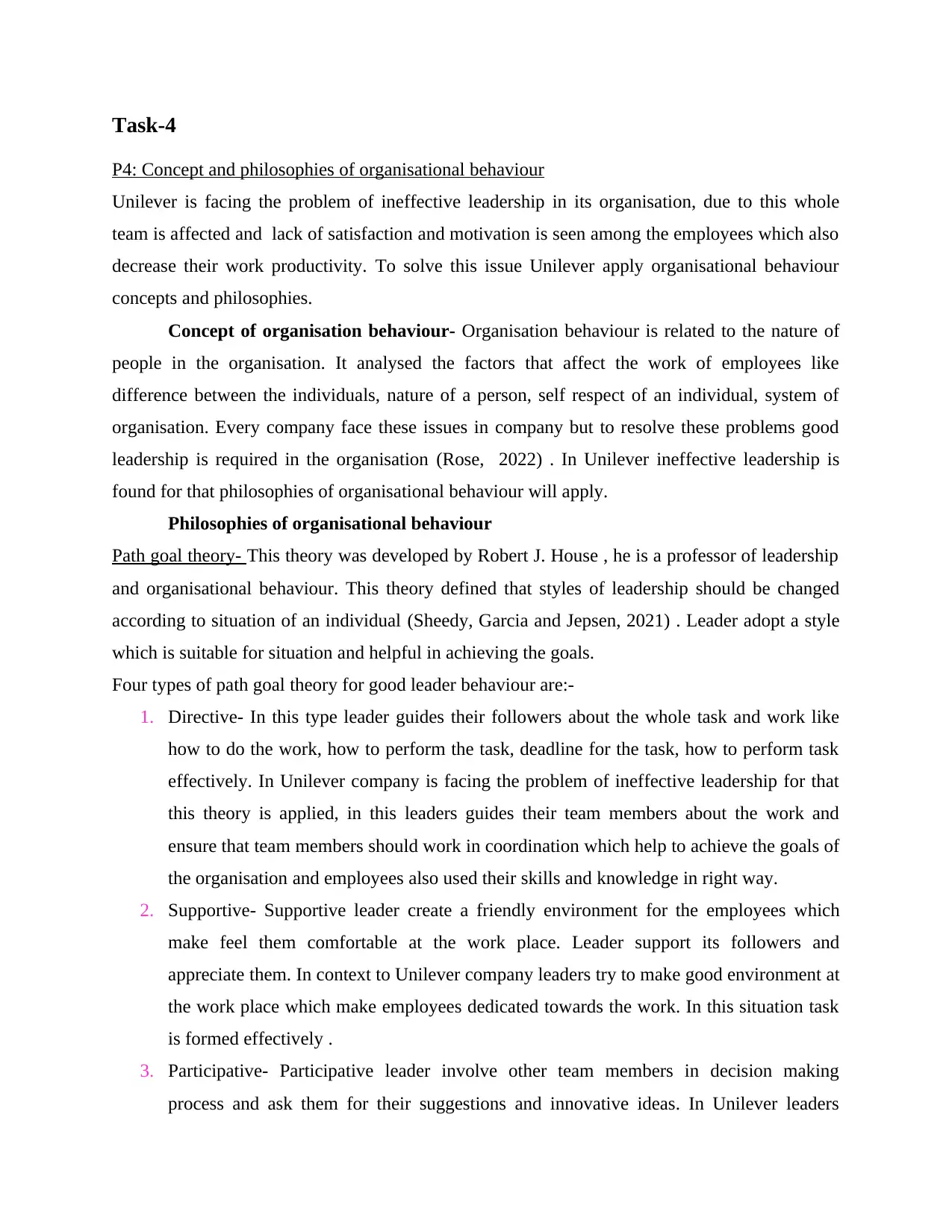
Task-4
P4: Concept and philosophies of organisational behaviour
Unilever is facing the problem of ineffective leadership in its organisation, due to this whole
team is affected and lack of satisfaction and motivation is seen among the employees which also
decrease their work productivity. To solve this issue Unilever apply organisational behaviour
concepts and philosophies.
Concept of organisation behaviour- Organisation behaviour is related to the nature of
people in the organisation. It analysed the factors that affect the work of employees like
difference between the individuals, nature of a person, self respect of an individual, system of
organisation. Every company face these issues in company but to resolve these problems good
leadership is required in the organisation (Rose, 2022) . In Unilever ineffective leadership is
found for that philosophies of organisational behaviour will apply.
Philosophies of organisational behaviour
Path goal theory- This theory was developed by Robert J. House , he is a professor of leadership
and organisational behaviour. This theory defined that styles of leadership should be changed
according to situation of an individual (Sheedy, Garcia and Jepsen, 2021) . Leader adopt a style
which is suitable for situation and helpful in achieving the goals.
Four types of path goal theory for good leader behaviour are:-
1. Directive- In this type leader guides their followers about the whole task and work like
how to do the work, how to perform the task, deadline for the task, how to perform task
effectively. In Unilever company is facing the problem of ineffective leadership for that
this theory is applied, in this leaders guides their team members about the work and
ensure that team members should work in coordination which help to achieve the goals of
the organisation and employees also used their skills and knowledge in right way.
2. Supportive- Supportive leader create a friendly environment for the employees which
make feel them comfortable at the work place. Leader support its followers and
appreciate them. In context to Unilever company leaders try to make good environment at
the work place which make employees dedicated towards the work. In this situation task
is formed effectively .
3. Participative- Participative leader involve other team members in decision making
process and ask them for their suggestions and innovative ideas. In Unilever leaders
P4: Concept and philosophies of organisational behaviour
Unilever is facing the problem of ineffective leadership in its organisation, due to this whole
team is affected and lack of satisfaction and motivation is seen among the employees which also
decrease their work productivity. To solve this issue Unilever apply organisational behaviour
concepts and philosophies.
Concept of organisation behaviour- Organisation behaviour is related to the nature of
people in the organisation. It analysed the factors that affect the work of employees like
difference between the individuals, nature of a person, self respect of an individual, system of
organisation. Every company face these issues in company but to resolve these problems good
leadership is required in the organisation (Rose, 2022) . In Unilever ineffective leadership is
found for that philosophies of organisational behaviour will apply.
Philosophies of organisational behaviour
Path goal theory- This theory was developed by Robert J. House , he is a professor of leadership
and organisational behaviour. This theory defined that styles of leadership should be changed
according to situation of an individual (Sheedy, Garcia and Jepsen, 2021) . Leader adopt a style
which is suitable for situation and helpful in achieving the goals.
Four types of path goal theory for good leader behaviour are:-
1. Directive- In this type leader guides their followers about the whole task and work like
how to do the work, how to perform the task, deadline for the task, how to perform task
effectively. In Unilever company is facing the problem of ineffective leadership for that
this theory is applied, in this leaders guides their team members about the work and
ensure that team members should work in coordination which help to achieve the goals of
the organisation and employees also used their skills and knowledge in right way.
2. Supportive- Supportive leader create a friendly environment for the employees which
make feel them comfortable at the work place. Leader support its followers and
appreciate them. In context to Unilever company leaders try to make good environment at
the work place which make employees dedicated towards the work. In this situation task
is formed effectively .
3. Participative- Participative leader involve other team members in decision making
process and ask them for their suggestions and innovative ideas. In Unilever leaders
Paraphrase This Document
Need a fresh take? Get an instant paraphrase of this document with our AI Paraphraser
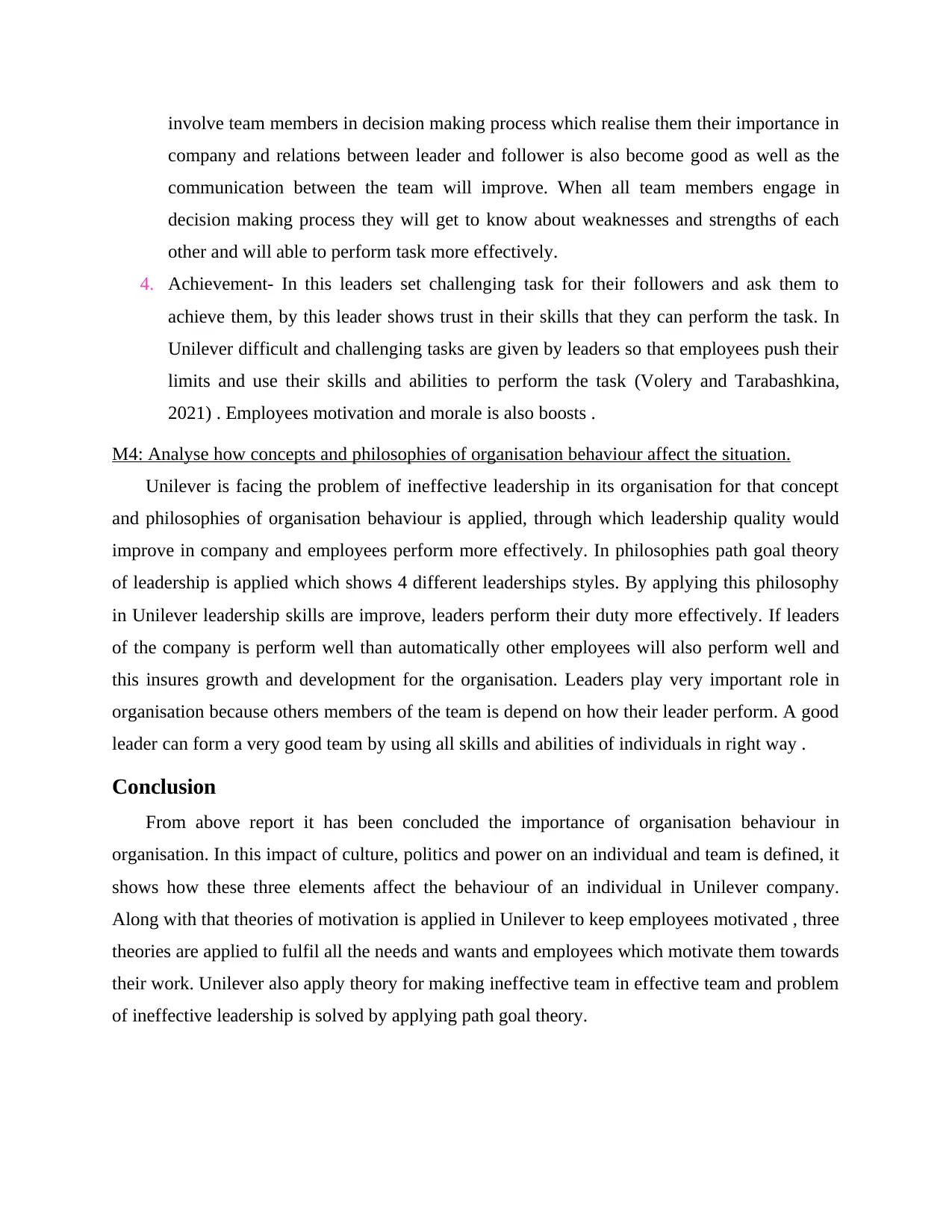
involve team members in decision making process which realise them their importance in
company and relations between leader and follower is also become good as well as the
communication between the team will improve. When all team members engage in
decision making process they will get to know about weaknesses and strengths of each
other and will able to perform task more effectively.
4. Achievement- In this leaders set challenging task for their followers and ask them to
achieve them, by this leader shows trust in their skills that they can perform the task. In
Unilever difficult and challenging tasks are given by leaders so that employees push their
limits and use their skills and abilities to perform the task (Volery and Tarabashkina,
2021) . Employees motivation and morale is also boosts .
M4: Analyse how concepts and philosophies of organisation behaviour affect the situation.
Unilever is facing the problem of ineffective leadership in its organisation for that concept
and philosophies of organisation behaviour is applied, through which leadership quality would
improve in company and employees perform more effectively. In philosophies path goal theory
of leadership is applied which shows 4 different leaderships styles. By applying this philosophy
in Unilever leadership skills are improve, leaders perform their duty more effectively. If leaders
of the company is perform well than automatically other employees will also perform well and
this insures growth and development for the organisation. Leaders play very important role in
organisation because others members of the team is depend on how their leader perform. A good
leader can form a very good team by using all skills and abilities of individuals in right way .
Conclusion
From above report it has been concluded the importance of organisation behaviour in
organisation. In this impact of culture, politics and power on an individual and team is defined, it
shows how these three elements affect the behaviour of an individual in Unilever company.
Along with that theories of motivation is applied in Unilever to keep employees motivated , three
theories are applied to fulfil all the needs and wants and employees which motivate them towards
their work. Unilever also apply theory for making ineffective team in effective team and problem
of ineffective leadership is solved by applying path goal theory.
company and relations between leader and follower is also become good as well as the
communication between the team will improve. When all team members engage in
decision making process they will get to know about weaknesses and strengths of each
other and will able to perform task more effectively.
4. Achievement- In this leaders set challenging task for their followers and ask them to
achieve them, by this leader shows trust in their skills that they can perform the task. In
Unilever difficult and challenging tasks are given by leaders so that employees push their
limits and use their skills and abilities to perform the task (Volery and Tarabashkina,
2021) . Employees motivation and morale is also boosts .
M4: Analyse how concepts and philosophies of organisation behaviour affect the situation.
Unilever is facing the problem of ineffective leadership in its organisation for that concept
and philosophies of organisation behaviour is applied, through which leadership quality would
improve in company and employees perform more effectively. In philosophies path goal theory
of leadership is applied which shows 4 different leaderships styles. By applying this philosophy
in Unilever leadership skills are improve, leaders perform their duty more effectively. If leaders
of the company is perform well than automatically other employees will also perform well and
this insures growth and development for the organisation. Leaders play very important role in
organisation because others members of the team is depend on how their leader perform. A good
leader can form a very good team by using all skills and abilities of individuals in right way .
Conclusion
From above report it has been concluded the importance of organisation behaviour in
organisation. In this impact of culture, politics and power on an individual and team is defined, it
shows how these three elements affect the behaviour of an individual in Unilever company.
Along with that theories of motivation is applied in Unilever to keep employees motivated , three
theories are applied to fulfil all the needs and wants and employees which motivate them towards
their work. Unilever also apply theory for making ineffective team in effective team and problem
of ineffective leadership is solved by applying path goal theory.
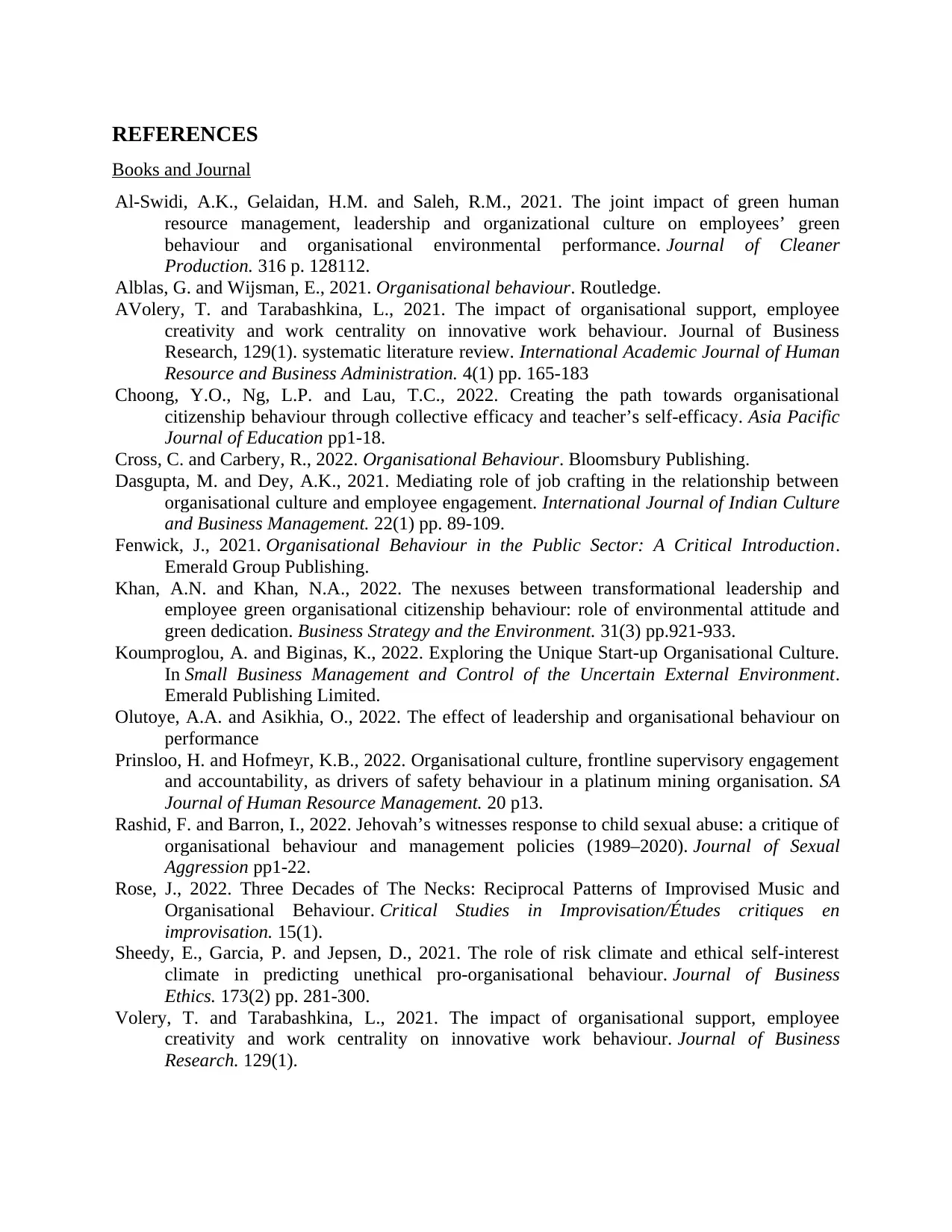
REFERENCES
Books and Journal
Al-Swidi, A.K., Gelaidan, H.M. and Saleh, R.M., 2021. The joint impact of green human
resource management, leadership and organizational culture on employees’ green
behaviour and organisational environmental performance. Journal of Cleaner
Production. 316 p. 128112.
Alblas, G. and Wijsman, E., 2021. Organisational behaviour. Routledge.
AVolery, T. and Tarabashkina, L., 2021. The impact of organisational support, employee
creativity and work centrality on innovative work behaviour. Journal of Business
Research, 129(1). systematic literature review. International Academic Journal of Human
Resource and Business Administration. 4(1) pp. 165-183
Choong, Y.O., Ng, L.P. and Lau, T.C., 2022. Creating the path towards organisational
citizenship behaviour through collective efficacy and teacher’s self-efficacy. Asia Pacific
Journal of Education pp1-18.
Cross, C. and Carbery, R., 2022. Organisational Behaviour. Bloomsbury Publishing.
Dasgupta, M. and Dey, A.K., 2021. Mediating role of job crafting in the relationship between
organisational culture and employee engagement. International Journal of Indian Culture
and Business Management. 22(1) pp. 89-109.
Fenwick, J., 2021. Organisational Behaviour in the Public Sector: A Critical Introduction.
Emerald Group Publishing.
Khan, A.N. and Khan, N.A., 2022. The nexuses between transformational leadership and
employee green organisational citizenship behaviour: role of environmental attitude and
green dedication. Business Strategy and the Environment. 31(3) pp.921-933.
Koumproglou, A. and Biginas, K., 2022. Exploring the Unique Start-up Organisational Culture.
In Small Business Management and Control of the Uncertain External Environment.
Emerald Publishing Limited.
Olutoye, A.A. and Asikhia, O., 2022. The effect of leadership and organisational behaviour on
performance
Prinsloo, H. and Hofmeyr, K.B., 2022. Organisational culture, frontline supervisory engagement
and accountability, as drivers of safety behaviour in a platinum mining organisation. SA
Journal of Human Resource Management. 20 p13.
Rashid, F. and Barron, I., 2022. Jehovah’s witnesses response to child sexual abuse: a critique of
organisational behaviour and management policies (1989–2020). Journal of Sexual
Aggression pp1-22.
Rose, J., 2022. Three Decades of The Necks: Reciprocal Patterns of Improvised Music and
Organisational Behaviour. Critical Studies in Improvisation/Études critiques en
improvisation. 15(1).
Sheedy, E., Garcia, P. and Jepsen, D., 2021. The role of risk climate and ethical self-interest
climate in predicting unethical pro-organisational behaviour. Journal of Business
Ethics. 173(2) pp. 281-300.
Volery, T. and Tarabashkina, L., 2021. The impact of organisational support, employee
creativity and work centrality on innovative work behaviour. Journal of Business
Research. 129(1).
Books and Journal
Al-Swidi, A.K., Gelaidan, H.M. and Saleh, R.M., 2021. The joint impact of green human
resource management, leadership and organizational culture on employees’ green
behaviour and organisational environmental performance. Journal of Cleaner
Production. 316 p. 128112.
Alblas, G. and Wijsman, E., 2021. Organisational behaviour. Routledge.
AVolery, T. and Tarabashkina, L., 2021. The impact of organisational support, employee
creativity and work centrality on innovative work behaviour. Journal of Business
Research, 129(1). systematic literature review. International Academic Journal of Human
Resource and Business Administration. 4(1) pp. 165-183
Choong, Y.O., Ng, L.P. and Lau, T.C., 2022. Creating the path towards organisational
citizenship behaviour through collective efficacy and teacher’s self-efficacy. Asia Pacific
Journal of Education pp1-18.
Cross, C. and Carbery, R., 2022. Organisational Behaviour. Bloomsbury Publishing.
Dasgupta, M. and Dey, A.K., 2021. Mediating role of job crafting in the relationship between
organisational culture and employee engagement. International Journal of Indian Culture
and Business Management. 22(1) pp. 89-109.
Fenwick, J., 2021. Organisational Behaviour in the Public Sector: A Critical Introduction.
Emerald Group Publishing.
Khan, A.N. and Khan, N.A., 2022. The nexuses between transformational leadership and
employee green organisational citizenship behaviour: role of environmental attitude and
green dedication. Business Strategy and the Environment. 31(3) pp.921-933.
Koumproglou, A. and Biginas, K., 2022. Exploring the Unique Start-up Organisational Culture.
In Small Business Management and Control of the Uncertain External Environment.
Emerald Publishing Limited.
Olutoye, A.A. and Asikhia, O., 2022. The effect of leadership and organisational behaviour on
performance
Prinsloo, H. and Hofmeyr, K.B., 2022. Organisational culture, frontline supervisory engagement
and accountability, as drivers of safety behaviour in a platinum mining organisation. SA
Journal of Human Resource Management. 20 p13.
Rashid, F. and Barron, I., 2022. Jehovah’s witnesses response to child sexual abuse: a critique of
organisational behaviour and management policies (1989–2020). Journal of Sexual
Aggression pp1-22.
Rose, J., 2022. Three Decades of The Necks: Reciprocal Patterns of Improvised Music and
Organisational Behaviour. Critical Studies in Improvisation/Études critiques en
improvisation. 15(1).
Sheedy, E., Garcia, P. and Jepsen, D., 2021. The role of risk climate and ethical self-interest
climate in predicting unethical pro-organisational behaviour. Journal of Business
Ethics. 173(2) pp. 281-300.
Volery, T. and Tarabashkina, L., 2021. The impact of organisational support, employee
creativity and work centrality on innovative work behaviour. Journal of Business
Research. 129(1).
⊘ This is a preview!⊘
Do you want full access?
Subscribe today to unlock all pages.

Trusted by 1+ million students worldwide
1 out of 12
Related Documents
Your All-in-One AI-Powered Toolkit for Academic Success.
+13062052269
info@desklib.com
Available 24*7 on WhatsApp / Email
![[object Object]](/_next/static/media/star-bottom.7253800d.svg)
Unlock your academic potential
© 2024 | Zucol Services PVT LTD | All rights reserved.




